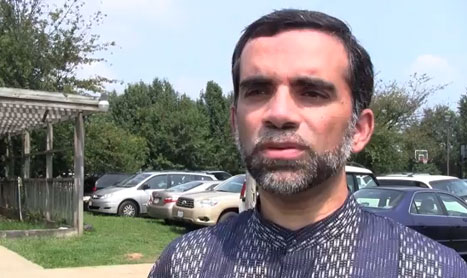GAITHERSBURG, Md. — A majority of Muslim Americans said their lives became more challenging in the decade that followed the Sept. 11 terrorist attacks, according to a new survey of Muslim attitudes in the United States.
“On a variety of measures Muslims are quite happy with life in the United States,” said Greg Smith, a senior researcher for the Pew Forum on Religion and Public Life, which conducted the survey. “At the same time, there are real challenges that Muslim Americans face.”
Muslim American Attitudes by the Numbers
55 – Percentage of Muslim Americans that said being a Muslim in the United States has become more difficult since Sept. 11.
1 – Percentage of Muslim Americans say suicide bombing and other forms of violence against civilians are justified
56 – Percentage of Muslim Americans that said they are satisfied with the direction of the country.
82 – Percentage of Muslim Americans satisfied with the way things are going in their lives.
Muslims in Maryland said that while the past decade brought new problems – intensified discrimination, harassment and increased scrutiny by law enforcement – it also brought new opportunities to connect more deeply with non-Muslim neighbors.
Sayed Hassan, a trustee and founder of Dar Al-Taqwa in Columbia, Md., said representatives from his mosque began to reach out to non-Muslim members of their community immediately after the attacks on New York and Washington.
They held meetings at interfaith centers, hosted open houses at their mosque and discussed with police how to respond to harassment. Those efforts continue today.
“We contained the problems in the beginning,” he said. “We built that bridge and built those good relationships,” he said.
Yet despite a decade of outreach by the Muslim community, many Americans still see strong ties between Muslim Americans and Islamic extremists. Forty percent of the general public said they think some Muslim Americans support Islamic extremists, according to the Pew survey.
Only 1 percent of Muslim Americans say suicide bombing and other forms of violence against civilians are justified to defend Islam, according to the survey.
The survey, released on Aug. 30, was based on telephone interviews with 1,033 Muslims in the United States conducted from April 14 to July 22, 2011. It has a margin of error of plus or minus five percentage points.
“We are not different,” said Sayed Naved, chairman of the Islamic Center of Maryland in Gaithersburg, Md. “We are peace loving people, and we do not want some few extremists defining what our beliefs are.”
Naved said he believes the Sept. 11 attacks were “pure murder.”
“My son who was five years old at that time kept repeating the same question that ‘How can these people do this? They are not Muslims. They can not be Muslims,’ ” he said.
Khaled Bannout, a physician who lives in Germantown, Md., said he was saddened by both the loss of life on Sept. 11 and by the misrepresentation of Islam it portrayed.
“Somebody hijacked the name of my religion and did this tragedy,” he said. “So we got hit twice.”
Since Sept. 11, Bannout said Muslim Americans have had to connect with the general public.
“Muslims are doing their job about doing outreach, trying to explain their religion, and trying to merge to the culture and not stay isolated like what was before,” he said.
Fifty-five percent of the Muslim Americans surveyed said being a Muslim in the United States has become more difficult since Sept. 11. But despite the challenges of the last decade, Muslim Americans are much more optimistic about the future of the United States than non-Muslims, according to the survey.
It showed that more than twice as many Muslims were satisfied with the direction of the country than non-Muslims – 56 percent to 23 percent.
Smith, of the Pew Center, said that difference can be explained in part by the strong support in the Muslim community for President Barack Obama.
But Syed Q. Burmi, imam at the Islamic Society of Western Maryland, said he believes Muslim Americans are satisfied because they are taking advantage of traditional American freedoms – work and educational opportunities as well as the safe, secure environment.
Burmi said Muslim Americans play important roles in his community of Hagerstown, Md., many working as doctors and in other public services and leadership positions — jobs they may have not been able to do living in other countries.
“Because of that they do have some influence in the community,” he said. “They are doing something very special for society and for the general public.”

